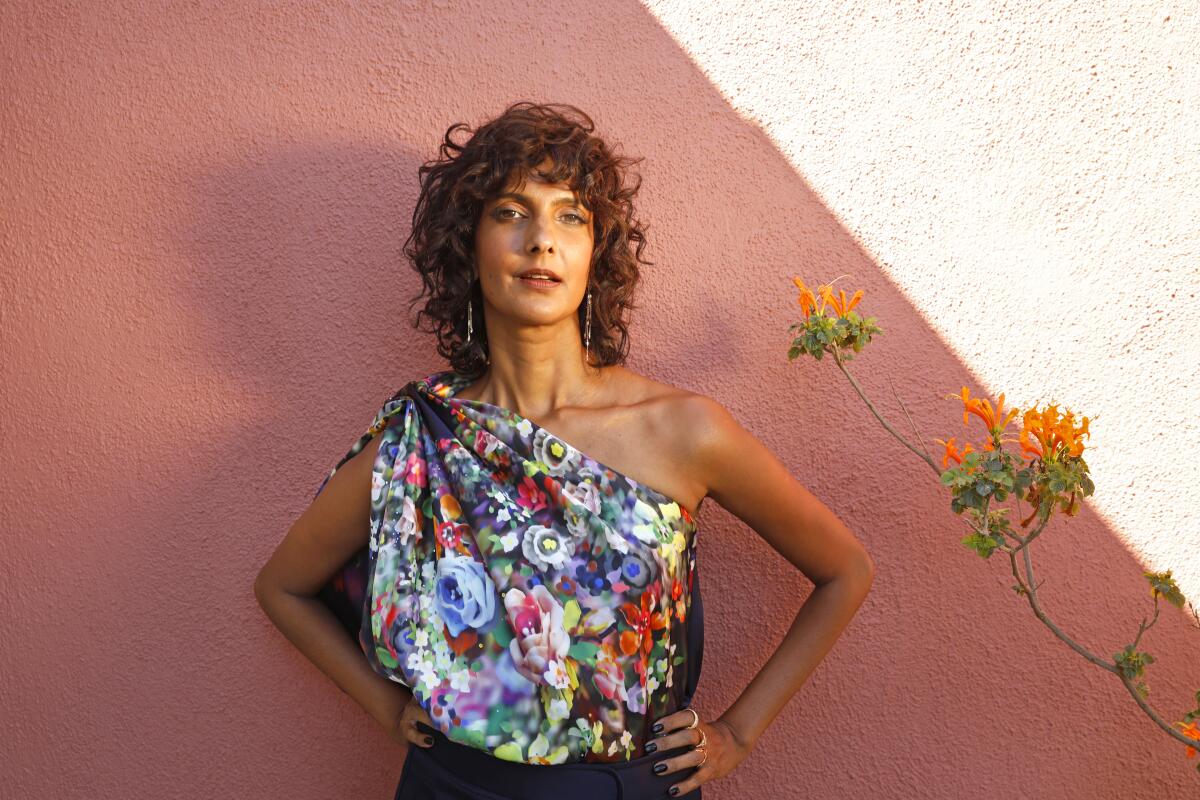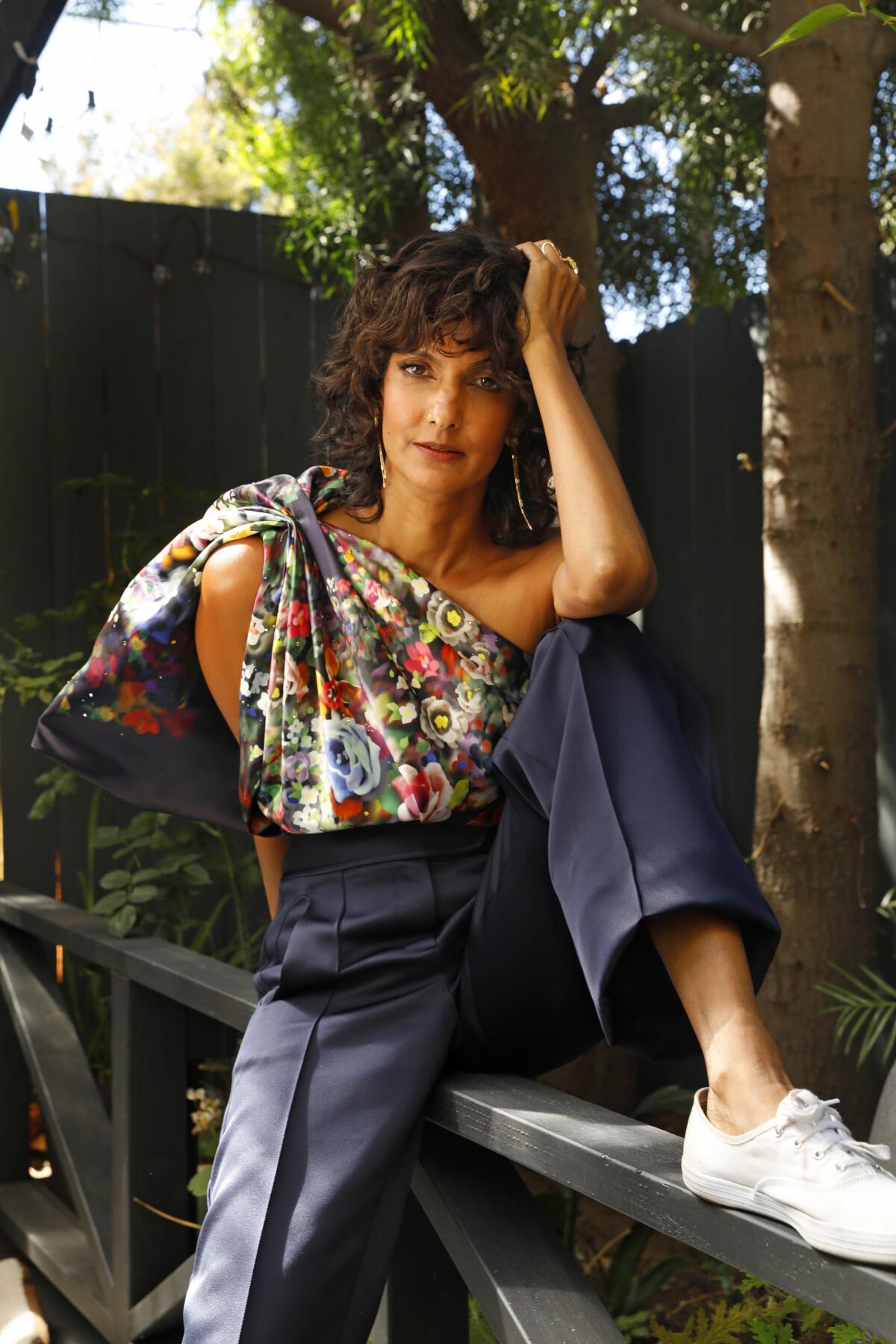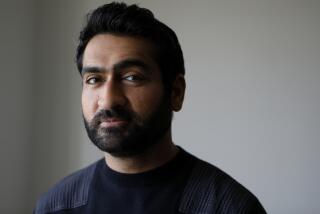Hollywood has long failed South Asian women. And Poorna Jagannathan is fighting back

- Share via
Nalini Vishwakumar is a strict, widowed Indian mother raising her teen daughter the only way she knows how: with an iron fist. A medical professional by day, she strives to make their San Fernando Valley home a fortress of tradition and discipline, enforcing lessons learned from her upbringing in India. She’s also pushing her academically gifted daughter toward an Ivy League education because, according to Nalini, being an average American kid is not enough: “Normal teenagers end up in prison, or worse, working at Jersey Mike’s.”
Opposite Maitreyi Ramakrishnan as the rebellious Devi in Netflix’s coming-of-age comedy “Never Have I Ever,” actor Poorna Jagannathan is so convincing as Nalini that one might expect the portrayal to be drawn in part from real life, but not so: When her own freshly woken teen comes shuffling down the stairs at their Culver City home at 1 p.m. in search of breakfast, Jagannathan hugged her boy and tousled his bedhead instead of reading him the riot act.
Then she turned to me and whispered: “Well, the secret’s out. I’m not Nalini.”
If acting is Jagannathan’s calling, challenging stereotypes is her superpower. She’s been poking holes in stock depictions of brown, Asian and immigrant women with smaller roles in TV’s most talked-about series for the better part of a decade: “House of Cards,” “Better Call Saul,” “Big Little Lies,” “The Night Of,” “Ramy.” “Defending Jacob.” But with “Never Have I Ever,” whose second season premieres Thursday, Jagannathan moves from the margins, where so many women of color continue to be relegated, to the center of the story.
Critic Lorraine Ali writes of seeing her immigrant upbringing in the San Fernando Valley reflected in the Mindy Kaling Netflix comedy ‘Never Have I Ever.’
Jagannathan embodies much of what made Mindy Kaling and Lang Fisher’s young-adult comedy about an Indian American high schooler a breakthrough series when it debuted last year, from its innate understanding and brilliant comedic manipulation of first/second generation culture clash to its nuanced portrayal of how grief, anger and fierce family love shape our lives. Nalini could have easily been a composite of stereotypes — an unyielding South Asian parent, a successful Indian doctor, a dutiful daughter-in-law. But in Jagannathan’s hands, she’s a refreshing representation of the realities behind cultural typecasting.
“The problem with stereotypes is not that they are untrue, but that they are incomplete,” said Jagannathan, 48, citing a quote from author Chimamanda Ngozi Adichie. “Yes, Devi is an overachieving, nerdy Indian American girl and Nalini is a tiger mom with zero capacity for finding middle ground. But they are all so much more than that. And that’s what makes this character so fulfilling to play. You see Nalini’s desires, her vulnerability, her grief alongside her relentlessly strict parenting. You see her as a three-dimensional person — something that American TV rarely affords minorities.”
Born in Tunisia to Indian parents, Jagannathan moved around the world because of her father’s career track as a diplomat, with stints in Ireland, Pakistan, Argentina, India, the U.S. and Brazil. She speaks English with an elegant, impossible-to-pinpoint accent, and she’s also fluent in Spanish, Portuguese, Hindi and Tamil. Her personal style is global bohemian: flowy pants, a silky tank top, flat sandals, wild curls framing her slender face. Her home is an eclectic mix of worldly decor (a patio shaded by swaths of gauzy fabric) and lived-in, working-mom utility (her kitchen counters are an organized clutter of frequently used spices and cooking implements). On her walls hang clues to her passion for social activism: Shepard Fairey’s portrait of a Muslim woman wrapped in an American flag hijab and a poster of her stage production “Nirbhaya,” a testimonial play inspired by the 2012 rape and murder of India’s Jyoti Singh.
“Clearly, Nalini is so different from me,” said Jagannathan over a lunch of vegetable and egg curries, spiced potatoes and rice, all prepared — unstereotypically — by her husband. “My kid wakes up, well, you just saw him. ... If he gets his own cereal, I’m like, ‘You are amazing!’ He puts sugar on top of his Frosted Flakes, I’m like, ‘You thought of that?! You’re a genius!’ There’s enough research now to say that mode of parenting is really destructive. But yeah, I’ll just see what happens,” she joked.
For her new Netflix series “Never Have I Ever,” Mindy Kaling picked Canadian teen Maitreyi Ramakrishnan from an open call of 15,000 hopefuls.
Comedic snark abounds in Season 2 of “Never Have I Ever,” which finds Devi mired in more messes of her own making. While she waits for her mother to make good on the threat of moving her to India, a new girl arrives on the scene, and all of a sudden Devi’s not the only South Asian girl at Sherman Oaks High. Nalini must put up with her daughter’s larks while coming to terms with her beloved husband’s untimely death, reconnecting with her mother-in-law and meeting a potential love interest. Kamala (Richa Moorjani), Devi’s super-hot cousin, is barely tolerating a nerdy boys club while completing her PhD at Caltech, and tennis star John McEnroe still serves as narrator. (Ask any fan of the show: It makes total sense.)
“’Never Have I Ever’ is a tightrope walk between outrageous comedy and intense grief,” said Jagannathan, who was fairly new to comedy before joining the series. “What’s so beautiful is that it’s really funny, but it’s so grounded in reality. It would be an impossible balance to strike as an actor if the writing didn’t support it. And I have a really hard time thinking American comedy is funny. I often don’t find it funny because it’s not grounded in reality. This show is.”
Jagannathan credits much of the show’s brash honesty and fearless exploration of identity and sexuality to Kaling’s sensibilities. “I remember reading for [Season 1’s] Ganesh Puja episode, which I think is just the funniest. Mindy stood up and was like, ‘Oh, my God, this is so triggering.’ So much of her comedy comes from what triggers her. It comes from her deepest vulnerabilities. That’s why she’s so good,” said Jagannathan. “And she’s not leaving a trail of crumbs in her wake. She’s leaving a 20-lane highway with great rest stops, good coffee and outlets.”

Giving back is intrinsic to Jagannathan’s intentions as an actor and as a human who has experienced, and recovered from, trauma. 2012’s “Nirbhaya: The Play,” made in collaboration with director and playwright Yael Farber, featured five women coming forward with their personal stories of sexual violence. Jagannathan, who was sexually assaulted at age 9, was one of those voices.
“The morning after the news of Jyoti Singh’s brutal rape broke ... I had the epiphany that my silence — the one that I thought protected me — actually made me complicit in the violence,” said Jagannathan. Coming forward with her story was terrifying, she said, especially since she’d never publicly spoken about her sexual assault before. But they performed “Nirbhaya” for three years, all over the world, nearly every night. After each show, throngs of people approached her and the rest of the cast, many breaking their silence for the first time.
“It was such a profound lesson in seeing art and activism collide,” she said. “We were seeing how a system could be dismantled just by the power of truth and how shame could be shifted from the survivor to the perpetrator where it rightly belongs. I think great art follows Newton’s third principle; it has a sort of luminosity to it that is in opposition to the darkness it may have been born out of.”
In her new Netflix series “Never Have I Ever,” co-creator Mindy Kaling introduces American viewers to the Hindu practice of Ganesh Puja.
“Never Have I Ever” may not seem like an obvious venue for reconciling with one’s past, but in Jagannathan’s eyes, it is. “It’s YA, but even adults are transported back into their high school years. I feel that with ‘Pen15’ too,” she said. “I don’t think you’re supposed to cry this much watching a comedy. But you can because now you’re an adult digesting and holding the grief or trauma or injustice that you couldn’t hold as a child.”
Jagannathan spent 15 years working in advertising before and during her attempts to break into acting. But by 2010 she was ready to give up on the dream of making a living onstage or in front of the camera. There were simply too few parts for women like her, and the one-dimensional roles that were available were ancillary at best.
Then, in 2011, she was offered a role in the Indian film “Delhi Belly,” and folks began to take notice of her quiet yet commanding screen presence. And as American television productions were beginning to diversify, things began to pick up for Jagannathan. Her breakthrough roles would include a heartbreaking performance as the bereaved immigrant mother whose son is wrongly accused in HBO’s haunting 2016 drama “The Night Of” and her portrayal of a passion-starved housewife in Hulu’s Muslim American comedy “Ramy.” But it was the central and multifaceted role of Nalini in “Never Have I Ever” that shattered something of a glass ceiling for Jagannathan and likely other women of color on the same path. Still, she knows better than to assume the revolution has arrived.
“As minorities, our screen time is increasing,” said Jagannathan. “We are featured more and fill more and more roles. [It’s] a huge win. But our ‘seen time’ remains low. ... Character arcs for minorities still feel underdeveloped and stereotypical. As a result, the audience doesn’t fully see us. They don’t get the three-dimensional version of us, and it’s that version that moves the needle. That’s the version that can create empathy, understanding and change.”
More to Read
The complete guide to home viewing
Get Screen Gab for everything about the TV shows and streaming movies everyone’s talking about.
You may occasionally receive promotional content from the Los Angeles Times.







